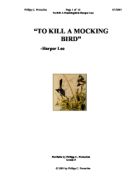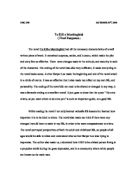The most important prominent focus in the movie involves the viewer’s concept of discrimination in all forms. Clearly, with the Tom Robinson accusation, the characters deal with extreme racial prejudice. Slang references to black men and their assumed deeds and involvements continue throughout the entire movie. Black people are assumed to occupy the lowest level of society in the Maycomb community. The city’s white population continues to reinforce their rigid unfounded beliefs. Atticus Finch’s closing argument during the trial clearly outlines his own views on racism. When the jury continues to show ignorance and predjudice, Atticus realizes there is little chance of proving Tom’s innocence and winning his case. The guilty verdict directly reflects the white population’s predjudice and assumed guilt of an accused black man in the social society of the South during this era.
Movie viewers believe Atticus Finch is a man of penetrating intelligence, legal wisdom, and exemplary character. He also appears to be the moral backbone and voice of reason in Maycomb. Atticus is convincing and clearly enables the viewer to understand that change needs to take place among the white residents of Maycomb. He is one of the few people in the town who understands and believes in the value of all people, regardless of their skin color or station in life. He is committed to fairness and justice and willingly views matters from these perspectives.
Atticus’ relationship with his two children is very interesting. He treats both children with respect and as mature individuals. Atticus is committed to their education, making sure they develop a sense of fairness in their relationships and respect for all people. Atticus keeps a steady hand with his approach to raising children. As with his children, Atticis does his best to uphold justice even though he assumes that the jury and townspeople have already judged that Tom Robinson is guilty. Atticus is a peaceful man and is restrained, even in a situation of personal violence. This was clearly demonstrated when Bob Ewell spit in his face. Atticus showed no violence or retaliation toward Ewell. One of the reasons Atticus does not fight back is because he personally believes that it is inappropriate and he has taught his children this valuable lesson in self restraint.
In addition to the movie’s utilization of the racial era, the secluded country town, the racial overtones, and Atticus Finch’s love and concerns for his children, other plot side bars enrich the story’s experience for the Viewer. The character of Boo Radley was introduced to the movie viewer as a slow-minded, timid man. The town’s children were extremely fearful of him and his family because of their seemingly dark side. Radley’s character becomes increasingly important as the movie’s plot progresses. Radley would watch the children from afar and secretly desire their friendship. This would be demonstrated by his placement of secret gifts for the children inside of a hole in a tree. Mayella was another of the child characters in the movie. When Mayella’s father, Bob Ewell, decides at one point in the movie to seek revenge on Atticus, he chooses to concentrate his actions toward the Finch children. As Boo witnesses Bob Ewell’s attack on Jem and Scout, Radley comes to their defense. He saves them from possible harm and takes them to safety.
To Kill a Mockingbird is a movie for all time, revolving around the depression era of the character and resulting behavior of people in a small Alabama town. Although the story has an appropriate ending, it is shameful that many people continue to display open hostility and discrimination to persons of different races. Sadly, there is still very much ignorance and misunderstanding that continues in today’s society. We must remember that racism is not a black and white issue – it never has been. People of different nationalities, religion, sexes, and cultures are also affected and involved. We can only hope that if children are taught to resolve differences, openly communicate, and learn to peacefully resolve differences will the problem cease to exist. Until changes are made, children will reflect the attitudes and beliefs of their parents throughout their life and erroneously judge people because of individual differences. Until people come together to get past racism and prejudice towards one another, these problems will always continue.
.







